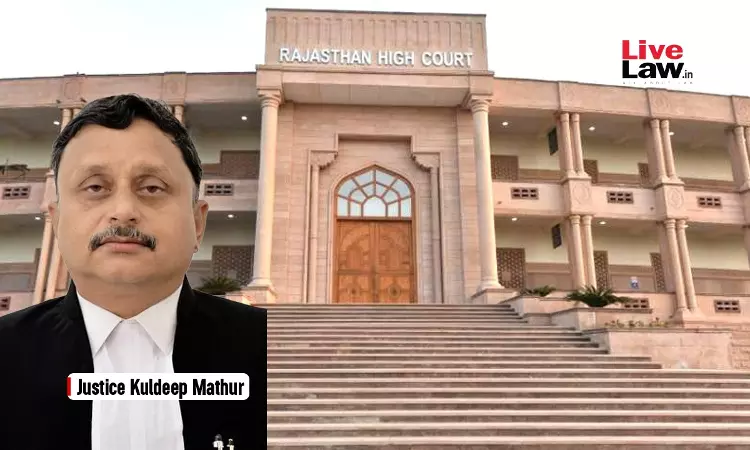- Home
- /
- High Courts
- /
- Rajasthan High Court
- /
- Creation Of Revenue Villages Not...
Creation Of Revenue Villages Not Legislative But Administrative Act, Can't Be Interfered With Unless Arbitrary: Rajasthan High Court
Nupur Agrawal
27 Sept 2025 1:25 PM IST
The Rajasthan High Court rejected a bunch of petitions challenging creation of new Revenue Villages without convening a Gram Sabha meeting, observing that the creation of a village or alternation of revenue village's boundary depends on the specific needs of the village and is thus essentially an administrative act. It was alleged by the petitioner that the proposal for creating new...
The Rajasthan High Court rejected a bunch of petitions challenging creation of new Revenue Villages without convening a Gram Sabha meeting, observing that the creation of a village or alternation of revenue village's boundary depends on the specific needs of the village and is thus essentially an administrative act.
It was alleged by the petitioner that the proposal for creating new Revenue Villages was forwarded without convening a Gram Sabha meeting as mandated under the provisions of the Panchayati Raj Act and Rules.
Further, it was submitted that certain proposed villages were named after local residents, which was also in violation of the circulars.
The bench of Justice Kuldeep Mathur opined that these circulars had no statutory force, unless it was established beyond doubt that the revenue villages were named after a particular person, deity or caste to appease a particular religion/political group/politically influential person, in an arbitrary and malafide manner, no challenge could be sustained.
“This is also for the reason that, historically, Indian cities and towns, both rural and urban, have been named based on a mix of Religious, Historical and Political Figures, couple with Geographical Characteristics and the Colonial Identities...the arguments raised by the respondents with regard to creation of Revenue Villages being a legislative act is rejected and it is thus held that the exercise of creation of new Revenue Villages under Section 16 of the Act of 1956 is an administrative act which is based on the administrative / policy decision of the Government".
"Though it is a settled position of law that administrative decisions are a prerogative of the executive and the same should not usually be interfered by the Court, but the said decisions can still be interfered with, if they are found to have been taken arbitrarily, with mala fide intent, or in a mechanical manner without proper application of mind," it added.
The Court firstly referred to the Supreme Court case of Union of India v Cynamide India Ltd. & Anr. in which the Supreme court made a distinction between legislative, administrative and quasi judicial acts, and opined that,
“Creation of new Revenue Villages through territorial adjustments is driven by administrative convenience and the need for effective land revenue management…The decision to establish a new Revenue Village is made based on the specific needs of a village, with the aim of ensuring that the benefits of development such as water supply, roads, healthcare facilities, electrification, etc. reach out to all the citizens, rather than being limited to those in the main settlement area.”
Further, the Court accepted the second argument put forth by the State that the circulars relied upon by the petitioners were only to provide guidelines and streamline the process, without having any stipulation that their non-adherence would render the entire process of creating new Revenue Villages invalid.
Reference was also made to certain precedents of the Rajasthan High Court which had held that legality of naming new Revenue Villages could not be examined by the Court under its writ jurisdiction unless it was proven that such naming was done with an intent to glorify a living individual or under the influence of an elected representative.
In this background as well as the guidelines under the Circulars, the Court concluded that as far as possible, the State Government should not name Revenue Villages after any person, caste, sub-caste, or religion. However, since the circulars carried no statutory force, scope of challenge was limited as mentioned earlier.
Finally, on the challenge made on the ground of no general consent or NOC being taken, the Court held that the circulars nowhere bound the authorities in convening a meeting of the Gram Sabha for obtaining such consent or NOC.
Accordingly, the petitions were dismissed.
Title: Mala Ram & Anr. v State of Rajasthan & Ors., and other connected petitions
Citation: 2025 LiveLaw (Raj) 329



